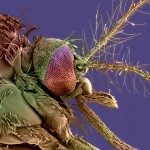Link to Pubmed [PMID] – 32088277
Link to DOI – S0001-706X(19)31832-710.1016/j.actatropica.2020.105414
Acta Trop. 2020 May; 205(): 105414
West Nile virus (WNV) is one of the most widely distributed mosquito-borne viruses in the world. In North Africa, it causes human cases of meningoencephalitis with fatalities in Algeria and in Tunisia, whereas only horses were affected in Morocco. The aims of this study were to detect WNV in mosquitoes and to determine seroprevalence of WNV in Moroccan horses by the detection of IgG antibodies. A total of 1455 mosquitoes belonging to four different species were grouped by collection site, date, and sex with 10 specimens per pool and tested for 38 arboviruses using a high-throughput chip based on the BioMark Dynamic array system. Out of 146 mosquito pools tested, one pool was positive for WNV. This positive pool was confirmed by real time RT-PCR. The serosurvey showed that 33.7% (31/92) of horses were positive for competitive enzyme-linked immunosorbent assay (cELISA) test. The flavivirus-sphere microsphere immnoassay (MIA) test, targeting three flaviviruses (WNV, Usutu virus (USUV) and Tick borne encephalitic virus (TBEV)) showed that 23 sera out of 31 were positive for WNV, two for USUV, two for USUV or WNV, and four for an undetermined flavivirus. Virus neutralization tests with USUV and WNV showed that 28 of 31 sera were positive for WNV and all sera were negative for USUV. This study reports, for the first time, the detection of WNV from Culex pipiens mosquitoes in Morocco and its circulation among horses. This highlights that the detection of arboviruses in mosquitoes could serve as an early warning signal of a viral activity to prevent future outbreaks in animals and humans.

